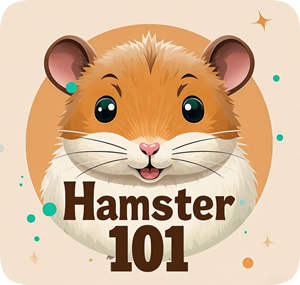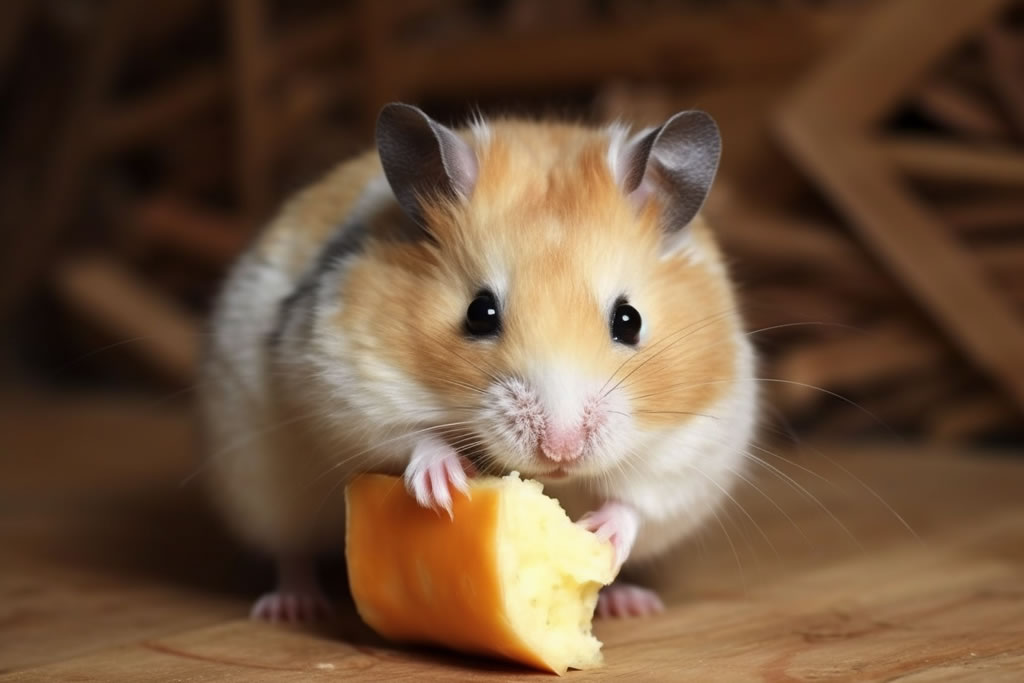Let’s cut through the cheddar-coated confusion: Yes, hamsters can eat cheese—but one wrong move could turn your furry friend into a constipated, lactose-intolerant fluffball.
I learned this the hard way when I gave my Syrian hamster, Gouda (yes, I named him that), a thumbnail-sized chunk of cheddar. What followed was 48 hours of him dragging his bloated belly across the cage like a tiny furry walrus, side-eyeing me like I’d committed rodent treason. 🐹🧀
After that $150 vet visit (and Gouda’s permanent grudge), here’s everything you need to know about cheese and hamsters—no corporate fluff, just hard-learned truths.
Why Cheese is Risky Business for Tiny Tummies
1. Lactose = Hamster Kryptonite
Unlike humans, 95% of hamsters are lactose intolerant after weaning. Their bodies stop producing lactase—the enzyme needed to digest dairy.
- What Happens: Undigested lactose ferments in their gut → gas, bloating, diarrhea.
- The Math: 1 pea-sized cheese bite = 8x more lactose than a dwarf hamster can handle.
Gouda’s Horror Story: Post-cheese, his poop resembled melted caramel. The vet called it “lactose-induced dysbiosis.” Never again.
2. Fat Overload
Cheese is 30-40% fat—a Syrian hamster needs just 0.5g of fat daily.
- Result: Obesity (yes, hamsters get chunky), fatty liver disease, and a hamster who’d rather nap than run their wheel.
- Worst Offenders: Brie (24g fat/100g), Cheddar (33g), Cream Cheese (34g).
3. Salt Poisoning
Even “low-sodium” cheese has 10x more salt than a hamster’s daily limit. Symptoms:
- Excessive thirst → water bottle obsession
- Kidney strain → expensive vet bills
The Safest Way to Serve Cheese (If You Must)
Step 1: Choose Wisely
- Best Options: Mozzarella (18g fat/100g), Swiss (27g), Cottage Cheese (4g)*
- Avoid: Blue cheese (mold risk), processed slices (chemicals), anything smoked/spiced.
⚠️ Cottage cheese must be unsalted, unflavored, and rinsed to remove excess sodium.
Step 2: Portion Control
| Breed | Max Serving | Frequency |
|---|---|---|
| Syrian | 1/4 pea-sized piece | 1x/month |
| Roborovski | Half a rice grain | Never* |
| Campbell’s Dwarf | NOPE | Never |
Robos can technically handle microscopic amounts but thrive better without.
Step 3: Prep Like a Pro
- Freeze cheese for 10 mins → easier to shave tiny slivers.
- Mix with veggie dust (grated carrot/broccoli) to dilute lactose.
- Serve on a spoon (prevents bedding contamination).
3 Signs Your Hamster Hates Cheese
- Food Hoarding Avoidance: Leaves cheese bits uneaten (a hamster snub).
- Toilet Paper Overuse: Lines nest extra thickly post-cheese (they know what’s coming).
- The Silent Treatment: Ignores you for 24+ hours (Gouda’s specialty).
Cheese Alternatives Hamsters Actually Love
- Mealworm Protein Bites
- Why: 50% protein, 0% lactose.
- Recipe: Crush dried mealworms + oat flour → form pea-sized balls.
- Chia Seed “Cheese”
- Why: Calcium-rich, gut-friendly.
- Prep: Soak chia seeds → spread thin paste on apple slice.
- Pumpkin Seed Butter
- Why: Healthy fats + magnesium.
- Tip: Use shelled seeds + grind into butter (no salt!).
“My Hamster Ate Cheese—Now What?!”
First Aid:
- Hydrate: Offer cucumber slices (high water content flushes system).
- Activated Charcoal: Vet-approved dose: 0.05ml (via syringe).
- Bland Diet: Cooked plain rice + boiled chicken for 24 hrs.
ER Signs:
- No poop >12 hrs (blockage risk)
- Wheezing/bloated belly
- Refusing favorite seeds
Gouda Update: He survived (thanks to sub-Q fluids) but now attacks cheese-themed toys.
Why Wild Hamsters Don’t Do Dairy
Syrian hamsters originate from arid regions where cheese doesn’t grow on cacti. Their guts evolved for seeds/insects—not dairy. That “they’ll love it!” pet store advice? Myth busted.
Final Verdict
Cheese is the junk food of hamster diets—technically “safe” in dust-sized doses, but why risk it? After Gouda’s Great Cheese Meltdown of 2023, I stick to chia treats and photoshop cheese pics for his Instagram.
Your hamster will live longer, poop better, and maybe forgive you for missing International Seed Day.



